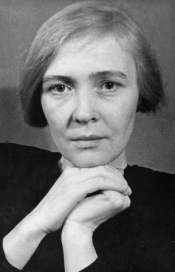
Marking the 110th anniversary of Olga Bergholz. Her voice supported life in the besieged Leningrad
May 16, 2020 marks the 110th anniversary of the birth of Olga Bergholz, who was called the voice of hope of the besieged Leningrad. Reading poetry of the poetess, her lively voice can be heard in the electronic reading room of the Presidential Library in the audio recordings of the famous besieged reporter Matvey Frolov. The library’s portal contains electronic copies of Olga Bergholz’s books: a collection of poems “Leningrad” (1944), the play “They Lived in Leningrad” (1945), co-written with the famous literary critic Georgy Makogonenko, as well as other materials dedicated to her life and work.
She knew how, like no other, to speak with a city immersed in inexpressible sorrow. The poetic poems of the poetess from the very heart of the besieged Leningrad give the reader the opportunity to see his life from the inside.
The poetic and human maturity of Olga Bergholz matured not from scratch. She was born in 1910 in St. Petersburg in the family of a factory doctor who lived on the working outskirts of the capital in the Nevsky Zastava district. In the pre-war fate of Bergholz, there was much that could break her. This woman had to survive the death of her daughters, a divorce from her husband, the famous poet Boris Kornilov, the arrest of her father, and then herself, on charges of having ties to enemies of the people; six months after the arrest, she was released and completely rehabilitated. “She buried two children / I myself was free, / I killed my third daughter / Before birth is prison...” - wrote the poet. Bergholz was fired from her job and expelled from the party. Her husband Boris Kornilov was shot in February 1938.
There was much to live with. All the more surprising is the internal changes that have occurred with this fragile poetess - she did not break, stoically melting resentment and pain into new mature poems. And the war came - managed to become the voice of the besieged Leningrad, its hope and epic heroine. “Vera Ketlinskaya, who headed the Leningrad branch of the Writers' Union in 1941, recalled how Olga Bergholz came to her in the early days of the war, and Olenka, as everyone called her at that time, was a “charming fusion of femininity and scope, a keen mind and childish naivety”. Unusually serious and collected, she asked Ketlinskaya what she can do. Tus she sent Bergholz to the literary and dramatic editorial office of the Leningrad Radio”, - said Natalya Rogova, chief librarian of the manuscript department of the National Library of Russia, as part of the video lecture “About the war and the victory in the language of the book (Olga Bergholz and the authors of the Siege Book”)”.
Olga Bergholz suddenly became a poet, personifying the stamina of the besieged city. At the Radio House, she broadcasted almost daily, later included in This is Radio Leningrad.
The siege survivors recall that the poet’s soft, soulful voice, heard on the radio in the besieged city, became their homeland. There was no heat, no light, no food, and only this voice supported hope in the townspeople. The reality was so cruel that it seemed: to people not to verses. But Bergholz wrote so that they became a fulcrum for everyone who listened to them.
The play by Bergholz and Makogonenko “They Lived in Leningrad” the action takes place during the first, most difficult siege winter: bombing, frozen streets and squares“, 125 blockade grams with fire and blood in half” (this line from the poem was immediately picked up by Bergholz). Hopelessly wandering somewhere past the dead and starving people shadow. People have lost everything but human dignity. The play was staged at the Tairov Chamber Theater.
In fact, there was fear. But strong people, not broken in spirit, dealt with him, as happened with the fragile Leningrad poetess. In the terrible days of bombing, fires, food cards, the quiet but firm voice of Olga Bergholz, a poetess who spoke the language of the besieged city, sounded on the radio.
Today, one of the streets of St. Petersburg bears the name of Olga Bergholz, and the granite slabs of the Piskaryov Memorial Cemetery are “spoken” with the inhabitants and guests of the city by the poet’s monumental spirit in words:
Here are the Leningraders.
Here the townspeople - men, women, children.
Next to them are Red Army soldiers.
With their whole lives they defended you, Leningrad,
The cradle of revolution.
We cannot list their noble names here,
So there are many of them under the eternal protection of granite.
But know, listening to these stones:
Nobody is forgotten and nothing is forgotten.
In the memory of generations, Olga Bergholz remained a courageous and unyielding Muse of the besieged city, a symbol of firmness and fearlessness of the Russian spirit.

